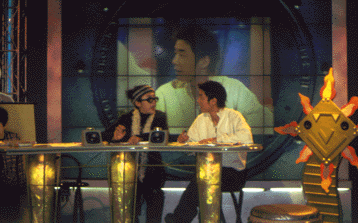Video jockeysNew profession gains popularityBy Vivian To Although MTV, or Music Television, was created in the U.S. in 1982, the introduction of two local music channels — Channel [V] and YMC — spurred the profession here in Hong Kong. A VJ’s areas of work are manifold.
Photo by Vivian ToMusic TV programmes rely on lively presentation.Said Miss Mary Liu, production administration manager of Channel [V]: “A VJs’ main duty is to present the latest music information to the audience in their own styles.” Mr. Brian Wong, a VJ for YMC, agreed. “My job includes delivering new songs and music videos, introducing singers and different types of music, and counting music charts.” VJs are also responsible for hosting phone-in programmes, talk shows, game shows, live variety shows, info-tainment programmes and outdoor functions. They also translate foreign music information and conduct interviews with singers. Hence, enriching their own music knowledge is a must. “I read many music magazines, listen to various songs and watch a lot of music videos,” said Miss Monique Au, a VJ for YMC. Mr. Wong said, “I often pay attention to current issues and incorporate them in my programmes whenever suitable.” Said another YMC VJ, Mr. Miguel Choi Hong-nin: “VJs are ‘music dictionaries’ who know more recent news about music than the audience. They can foresee the audience’s preferences and lead the music trend.” Being a VJ is a challenging and attractive career, and recruitment efforts often prompt a big reaction. However, finding suitable people is not easy because of the harsh requirements. “We emphasize language skills, since our channel is regional,” explained Miss Liu. Therefore, all Channel [V] VJs are “multi-linguists” who can speak fluent English, Mandarin, Cantonese and Japanese. Appearance and image are also very important requirements. Said Miss Liu: “VJs are not necessarily good-looking, but they must be charming, trendy, well-groomed and have ‘camera faces’. They should have distinct personalities and special styles.” According to Mr. Wong, talkativeness and eloquence are prerequisites of a good VJ. Said he: “Besides talking about music, VJs should be able to create atmosphere and even comfort a depressed audience by solving their problems.” The VJs find their jobs rewarding. Mr. Wong said, “This job provides me very good training and I have become braver and more quick-witted.” Said Mr. Miguel Choi: “Through interviewing different singers, I get to know their true selves and we become friends. Mark Owen and the Spice Girls are some of the examples.” Gaining popularity and unconditional support from the audience is another reward. Mr. Wong receives tonnes of letters and faxes from his fans asking about his personal particulars and expressing their admiration. Some even wait for him at the TV station every day and give him presents like handicrafts and knitwear. However, it is not always good for a VJ to be so popular. Mr. Wong explained, “Fanaticism not only frightens me, but also wastes the fans’ money and time. They behave in that way because they have no aspirations in life. “They can’t feel any care and sense of belonging in their families and resort to idol-worshipping.” The assistant channel manager of YMC, Mr. Wong Chi-chung, predicts the VJ profession will prosper in Hong Kong. Said he: “Foreign music is becoming more popular in Hong Kong and the penetration of music channels is broadening. “Visual images of music videos also raise music’s appreciative value. All these factors favour MTV culture and, in turn, VJ culture.” |
